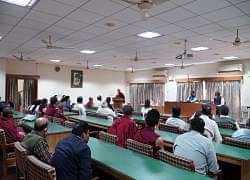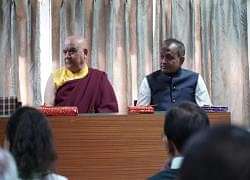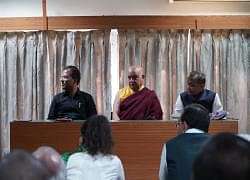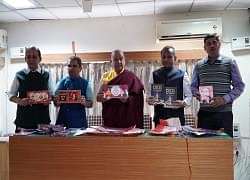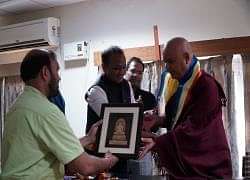About Central University of Tibetan Studies
The Central Institute of Higher Tibetan Studies (Deemed University) (CIHTS) in Sarnath, Varanasi, is the country's only one of its type. The Institute was founded in 1967. The Institute was proposed during a dialogue between Pt. Jawaharlal Nehru, India's first Prime Minister, and His Holiness the Dalai Lama with the goal of educating the young Tibetan Diaspora and those from India's Himalayan border regions who share religion, culture, and language with Tibet.
Candidates must have completed class VIII in any recognised school and have Tibetan language proficiency on par with class VIII standards in order to be considered for admission to the P.M. first year at this Institute. Candidates must also have proficiency in Hindi or English at the equivalent of standard VIII. Central Institute of Higher Tibetan Studies courses offered are UG, PG, M.Phil and PhD programmes spread over different specialisations.
The qualified candidates will be required to take an admission exam. Two written papers will make up the admission test. It will be required of the qualified candidates to take an admission test. Two written papers will be included in the admission test. Only applicants who clearly passed the entrance exam will be eligible for Central University of Tibetan Studies admission.
The Central Institute of Higher Tibetan Studies, Sarnath Varanasi, uses the Shantarakshita Library as its primary library system. Since the Institute's founding in 1967, it has served as a one-of-a-kind information resource hub for academics studying Tibetan and Buddhist studies. The famous Indian Bhuddhist scholar Acharya Shantarakshita of the Nalanda University, who travelled to Tibet in the eighth century to further the cause of dharma, is honoured by having this library bear his name. The institute has distinct restricted hostel facilities for males and girls. The hostels also provide a gym and fitness centre to keep students healthy and fit.
The Central University of Tibetan Studies library now has over 87,000 printed books and xylographs, 2000 bound journals, 7712 electronic materials, and 9742 microfilm and film titles. The library offers library services based on a bilingual bibliographical database of the library resources and is well-equipped with the most recent ICT infrastructure. The institute emphasises in holistic development of its students and hence provides facilities for various sports such as basketball, football, and badminton courts. The Institute runs exchange/collaboration programmes with a number of Indian and international universities and academic institutions.
Top Courses at Central University of Tibetan Studies
| Course Name | Apply Now | Fees | Short Eligibility |
| B.A. (Bachelor of Arts) | Higher secondary education (10+2) or equivalent, Minimum 50% aggregate for general category, Minimum 45% aggregate for reserved category, Good command of the English language, Adequate proficiency in Tibetan | ||
| Diploma | 10+2 education from a recognized board or institution, proficiency in English, proficiency in Tibetan languages | ||
| B.Ed. (Bachelor of Education) | Bachelor's degree, Minimum 50% marks, Strong interest in teaching, Excellent communication skills, Successful completion of an entrance exam | ||
| M.A. (Master of Arts) | Bachelor's degree in the relevant field from a recognized university, minimum of 50% marks, strong background in Tibetan studies, proficiency in the Tibetan language. | ||
| Ph.D. (Doctor of Philosophy) | Master's degree in a relevant field, Minimum 55% marks or equivalent CGPA, Qualified in a national level entrance exam such as UGC-NET or equivalent, Proficiency in Tibetan language | ||
| B.Sc. + B.Ed. | Higher secondary education (10+2), Minimum aggregate of 50% marks in the Science stream, Valid score in the entrance examination, Age criteria as specified by the university | ||
| Bachelor of Arts+Bachelor of Education-B.A.+B.Ed. | 10+2 or equivalent examination, minimum of 50% aggregate marks, passed entrance examination |
Table of Contents
Central University of Tibetan Studies Courses and Admission 2025
Central University of Tibetan Studies Highlights
- Study ModeRegular
- Established Year1967
- Hostel AvailabilityYes
- Approved ByUniversity Grants Commission (UGC)
- Total Faculty0
Central University of Tibetan Studies FAQs
What is the eligibility for Central University of Tibetan Studies Tibetan Language?
What is the Central University of Tibetan Studies BSRMS course duration?
What Central Institute of Higher Tibetan Studies fees?
What is Central University of Tibetan Studies application mode?
Is Central University of Tibetan Studies a self-running institute?
What are the facilities offered at Central University of Tibetan Studies?
What is Central University of Tibetan Studies admission criteria?
What Central Institute of Higher Tibetan Studies courses?
When was Central University of Tibetan Studies established?
Central University of Tibetan Studies Campus Facilities and Infrastructure
Campus Facilities
Central University of Tibetan Studies Scholarships
| Gender | Male | Female |
|---|---|---|
| Total | 141 | 64 |
| OBC | 0 | 0 |
| SC | 0 | 0 |
| ST | 31 | 12 |
| Muslim | 0 | 0 |
| PWD | 0 | 0 |
| Minority Community | 141 | 64 |
Admission Updates for 2025
Similar Colleges
Shri Ranglaxmi Adarsh Sanskrit Mahavidyalaya
Sri Agrasen Kanya P.G. College
Explore More Arts Colleges in Uttar Pradesh
- By State
- By City
By Degree
By Specialization
By Degree
By Specialization
- Colleges in Varanasi
- Central University of Tibetan Studies


